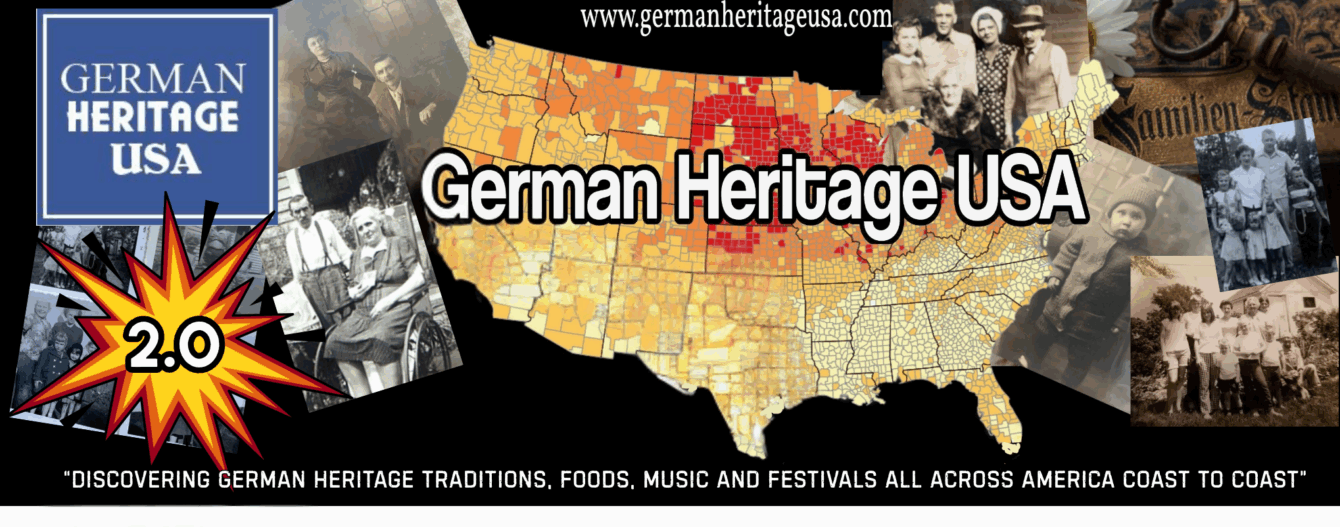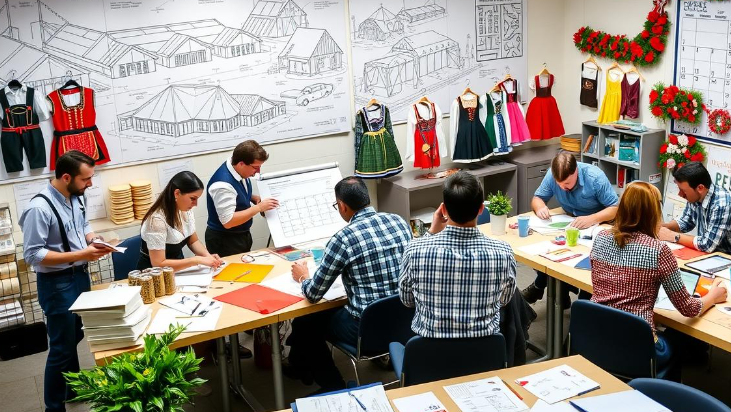Behind the Scenes of Oktoberfest: Planning a Mega Event
GERMAN HERITAGE USA | AFFILIATE DISCLAIMER: This post may or may not contain affiliate links which means we may receive a commission for purchases made through links. We will only recommend products that we have personally used or that we truly trust. Learn more on our Private Policy and Disclaimer Page located under our Terms Of Service tab above.
Behind the Scenes of Oktoberfest: Planning a Mega Event. Oktoberfest in Munich is a huge event that shows off the city’s culture and planning skills. Every year, millions come to celebrate in Bavaria’s capital. The planning for Oktoberfest takes all year, with lots of details and hard work.
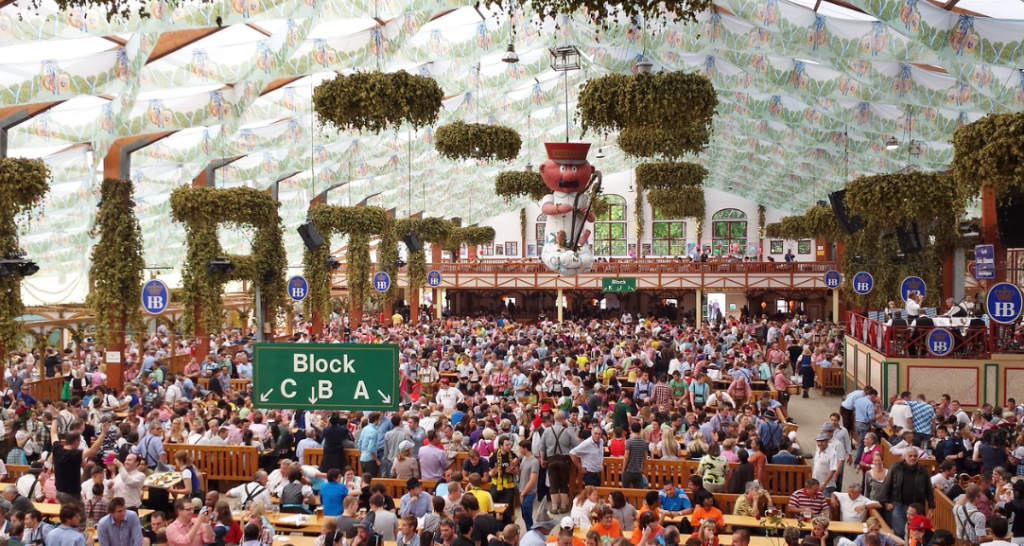
The festival is huge. Over 16 days, it welcomes 6-7 million people. They drink about 7 million liters of beer. Plus, they eat a lot, with over 2 million roasted chickens and 1.5 million sausages.
Planning Oktoberfest is a big job. It’s like setting up a temporary city in Munich. There are 14 big beer tents, each with its own vibe and beers from Munich’s top breweries.
The festival celebrates Munich’s traditions. There’s a big parade with 10,000 people and traditional Märzenbier in the tents. Oktoberfest is a big celebration of Bavarian culture.
Key Takeaways
- Oktoberfest attracts 6-7 million visitors over 16 days
- 7 million liters of beer are consumed during the festival
- Event planning involves creating a temporary city with full infrastructure
- 14 major beer tents feature beers from Munich’s six main breweries
- The festival showcases Bavarian cultural traditions and heritage
The Scale and Scope of Munich’s Mega Festival
Oktoberfest is a huge celebration of Bavarian culture, attracting millions to Munich each year. It lasts for 16 days, showing the detailed planning needed for such a big event. The festival takes place on Theresienwiese, a square kilometer that turns into a lively area.
Impressive Numbers: Visitors, Consumption, and Duration
The size of Oktoberfest is amazing. It has 15 main beer tents, each holding up to 10,000 people. Beer, in 1-liter steins, comes from six famous Munich breweries: Paulaner, Spaten, Hacker-Pschorr, Augustiner, Hofbräu, and Löwenbräu.
| Feature | Statistic |
|---|---|
| Duration | 16 days |
| Main Beer Tents | 15 |
| Tent Capacity | Up to 10,000 per tent |
| Beer Price Range | €9.80 to €10.10 per liter |
| Outdoor Seating | Around 25,000 seats |
Economic Impact on Munich
Oktoberfest has a big impact on Munich’s economy. It boosts tourism, helps local businesses, and creates temporary jobs. The event affects many parts of the city’s economy, from transportation to hospitality.
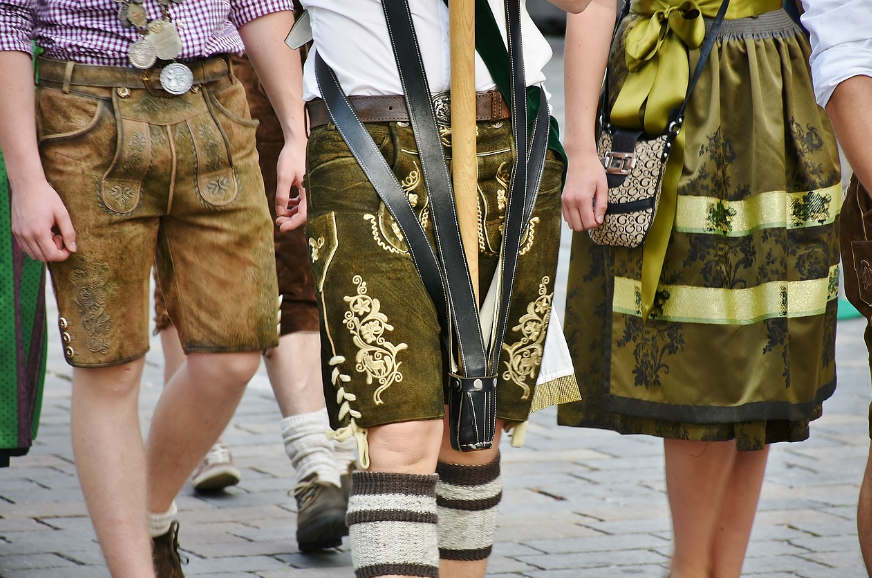
Historical Evolution of the Festival
Oktoberfest has changed a lot since it started in 1810. It began as a royal wedding celebration and has grown into a global event. Today, it showcases Bavaria’s culture, offering authentic cuisine and a carnival vibe.
“Oktoberfest is more than just a festival; it’s a cultural phenomenon that brings people together from all walks of life to celebrate Bavarian traditions.”
Behind the Scenes of Oktoberfest: What It Takes to Organize a Mega Fest
A bustling event planning office filled with detailed blueprints of large tents, colorful lederhosen and dirndl costumes hanging on the walls, stacks of beer mugs, vibrant festival decorations, a large calendar marked with important dates, and a team of diverse individuals collaborating over tables covered in notes and sketches, all set against a backdrop of iconic Bavarian motifs.
Planning Oktoberfest is a huge job that needs top event management skills. The festival is huge, with 14 beer tents welcoming millions over 16 days. Months before, teams work on setting up and planning entertainment.
Breweries are key to Oktoberfest’s success. They make special beers, mixing tradition with new ideas. Some offer up to four German-style beers, pleasing many tastes while staying true to the festival’s roots.
The logistics of Oktoberfest are incredible. Organizers handle:
- Setting up huge beer tents for 10,000 guests each
- Managing big food and drink supplies
- Planning cultural events and shows
- Ensuring safety for millions of visitors
Getting a table in popular tents can sell out by June or July. This shows how popular Oktoberfest is and the need for early planning. Brewers face challenges like finding ingredients and keeping beer quality high.
| Aspect | Details |
|---|---|
| Duration | 16 days (Sept 22 – Oct 7, 2018) |
| Beer Tents | 14 |
| Capacity per Tent | Up to 10,000 guests |
| Planning Start | Months in advance |
| Reservation Sellout | By June or July |
Organizing Oktoberfest is all about keeping traditions alive while meeting today’s needs. It shows the strength of good event management and the lasting charm of this cultural event.
Infrastructure and Logistics Planning
Oktoberfest turns Munich into a lively temporary city. The event’s logistics are carefully planned to welcome millions over two weeks. From mid-September to early October, the festival grounds are filled with activity. They need strong systems to manage the huge number of visitors.
Building a Temporary City: Utilities and Services
The festival sets up electricity, water, and plumbing systems. Huge beer tents, like grand ballrooms, can hold thousands. The Paulaner tent alone can fit over 8,000 guests.
A special beer loop moves the beer at 25 cm per second. It goes from big tanks to thirsty guests.
Transportation and Access Management
Getting people around is a big part of the event. The festival starts at 10 AM weekdays and an hour earlier on weekends. Public transport is key, with longer hours and more services for the crowds.
This planning makes sure visitors can get in and out smoothly. The festival closes at 11:30 PM to midnight.
Waste Management and Sustainability Measures
Keeping the festival green is important. With nearly eight million one-liter mugs of beer served, managing waste is a big task. The event uses new ways to deal with trash and encourages eco-friendly actions on the grounds.
| Aspect | Data |
|---|---|
| Festival Duration | 2+ weeks |
| Daily Operating Hours | 10 AM – 11:30 PM/Midnight |
| Largest Tent Capacity | 8,000+ guests |
| Beer Consumption | ~8 million liters |
| Beer Transport Speed | 25 cm/second |
The “mug-o-meter” system shows how Oktoberfest mixes tradition with tech. It tracks beer flow, temperature, and pressure in real-time. This helps plan and keep the beer quality high.
Such tech advancements help the festival stay popular while being eco-friendly. It shows how to keep a centuries-old event exciting for millions today.
Security and Crowd Control Measures
Oktoberfest is huge, with a million visitors every day. It needs strong security and safety plans. The goal is to make sure everyone has a good time safely.
Entrance Points and Security Checkpoints
A big steel fence surrounds the festival area. There are staffed entry points. Security checks bags, stopping big backpacks to keep everyone safe.
Emergency Response Systems
The festival has faced tough times, like the 1980 bombing. It killed 13 and hurt over 200. Now, there are detailed emergency plans. They help keep everyone safe quickly.
Collaboration with Local Law Enforcement
The festival works with Munich’s police. This team-up helps keep things safe. It uses local knowledge and event experience together.
| Security Aspect | Implementation |
|---|---|
| Perimeter Security | 2-meter high steel fence |
| Entrance Screening | Bag checks, size restrictions |
| Emergency Response | Rapid incident management systems |
| Law Enforcement | Collaboration with local police |
Oktoberfest’s security shows its dedication to safety. It lets millions enjoy the fun without worry.
Beer Tent Operations and Management
Oktoberfest tents are the heart of the festival. There are 14 major tents, each run by one of Munich’s six big breweries. These huge tents can hold between 5,000 to 10,000 people.
Behind the Scenes of Oktoberfest: Planning a Mega Event. Managing these tents is a big job. Bavarian breweries work hard to keep things running smoothly. Each tent has restrooms and kitchens for thousands of visitors every day.
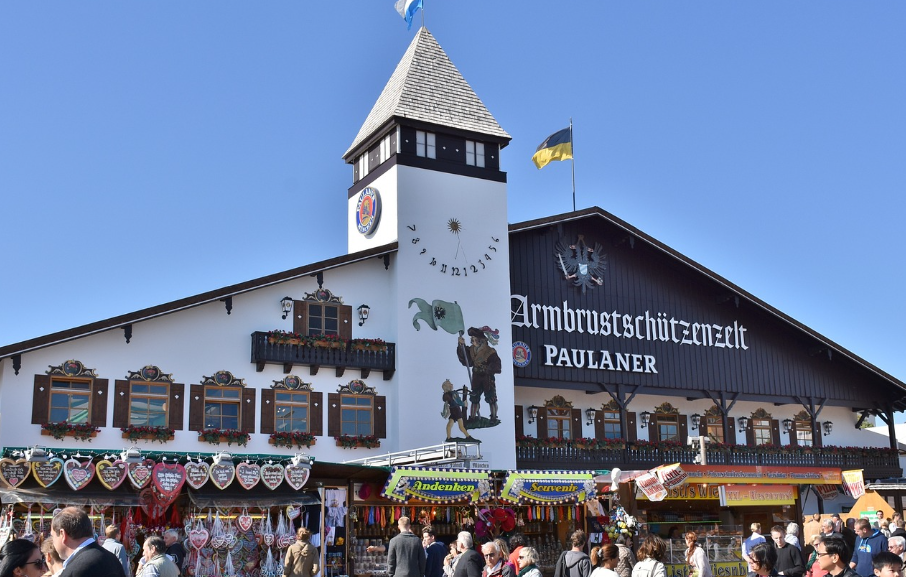
“Vibrant Oktoberfest beer tent bustling with activity, large wooden tables filled with colorful beer steins, cheerful patrons wearing traditional Bavarian attire, staff efficiently serving drinks and food, decorative banners and lively ambiance, festive lighting and rustic wooden structure, surrounded by autumn foliage.”
Each tent has its own special feel. Some have special events or themes. This adds to the festival’s charm. The beer tent operations are key to the event’s success, with 72% of visitors from Bavaria and 15% from places like the US, Canada, and Australia.
| Aspect | Details |
|---|---|
| Number of major beer tents | 14 |
| Tent capacity range | 5,000 – 10,000 people |
| Last call time | 10:30 PM |
| Lights out time | 11:30 PM |
| Bavarian attendees | 72% |
| Foreign attendees | 15% |
Traditional Food Service Coordination
Behind the Scenes of Oktoberfest: Planning a Mega Event. Oktoberfest’s food service is a huge operation that brings Bavarian cuisine to life. The festival’s menu features traditional dishes that delight millions every year. Managing food service at this scale needs careful planning and execution.
Supply Chain Management
Supplying fresh ingredients for the festival is a big challenge. In 2011, over 500,000 roasted chickens were eaten at Oktoberfest. This demand requires a smooth supply chain to keep ingredients flowing to the beer tents.
Kitchen Operations in Beer Tents
Beer tent kitchens work hard to serve thousands of meals daily. They are open from 10 a.m. to 10:30 p.m. on weekdays and until 11:30 p.m. on weekends. These kitchens must efficiently produce meals while keeping the quality of traditional Bavarian dishes high.
Quality Control and Food Safety
Behind the Scenes of Oktoberfest: Planning a Mega Event. Oktoberfest takes food safety seriously. The menu includes favorites like pretzels, flatbread, and roasted chicken. Kitchens follow strict protocols to ensure every dish meets high quality standards.
| Food Item | Quantity Consumed (2011) | Serving Hours |
|---|---|---|
| Roasted Chicken | Over 500,000 | 10 a.m. – 10:30 p.m. (Weekdays) |
| Pretzels | Data not available | 10 a.m. – 11:30 p.m. (Weekends) |
| Beer | 7.9 million liters | 10 a.m. – 10:30 p.m. (All days) |
Entertainment and Cultural Programming
Oktoberfest entertainment brings Bavarian traditions to life. The festival’s cultural events showcase the rich heritage of Munich. From lively music to colorful parades, there’s something for everyone.
Traditional Music and Performances
Brass bands fill the air with Bavarian tunes in beer tents. The Hofbräu-Festzelt, the largest tent, hosts over 7,000 people indoors. Guests enjoy live music while savoring traditional food like roasted chicken and Obatzda.
Behind the Scenes of Oktoberfest: Planning a Mega Event – Parades and Special Events
The festival kicks off with a grand parade featuring brewers in traditional costumes. Special events include the “Wies’nwirt Auftritt” on opening day. Free brass concerts take place on the second and third Sundays.
Family-Friendly Activities
Behind the Scenes of Oktoberfest: Planning a Mega Event. Tuesdays are official Children’s Days with reduced prices on rides. Families can enjoy special menus and discounts at smaller eateries. The festival offers a mix of fun for all ages.
| Event | Description | Date |
|---|---|---|
| Brewers’ Procession | Grand parade with traditional costumes | Opening day |
| O’Zapft is! | Opening ceremony | First day |
| Children’s Day | Reduced prices on rides and special menus | Tuesdays |
| Brass Concerts | Free performances in tents | 2nd and 3rd Sundays |
| Closing Ceremony | Fireworks and archery displays | Last day |
Oktoberfest’s cultural events attract 6 million visitors yearly. With 70% Bavarians and 30% tourists, it’s a true celebration of German culture. The festival’s mix of entertainment keeps the Bavarian spirit alive for 16 days straight.
Vendor and Exhibitor Management
Behind the Scenes of Oktoberfest: Planning a Mega Event. Oktoberfest vendors are key to the festival’s lively atmosphere. The team manages a wide range of attractions, from carnival rides to food stalls. With over 6 million visitors each year, the festival boosts Munich’s economy.
The festival has 34 beer tents, each holding up to 10,000 people. But there’s more than just beer. Visitors enjoy traditional foods, like 2 million roasted chickens and 1.5 million sausages. Beer costs about €11 ($13 USD) per liter, ensuring fair prices and quality.
The “Oide Wiesn” or Old Oktoberfest area adds a vintage charm. It features classic rides and entertainment. The team works hard to keep the festival’s heritage alive, offering a unique experience for millions each year.
FAQ
How many visitors does Oktoberfest attract?
Oktoberfest draws 6-7 million visitors to Munich. It’s the world’s largest folk festival, lasting 16 days.
How much beer is consumed during Oktoberfest?
About 7 million liters of beer are drunk. Plus, 2 million roasted chickens and 1.5 million sausages are enjoyed.
How long does Oktoberfest last?
Oktoberfest goes on for 16 days. It happens from late September to early October.
How large is the Oktoberfest venue?
The festival takes place on Theresienwiese. It covers about one square kilometer.
How much does beer cost at Oktoberfest?
Beer is pricier than at home. A liter costs around €11 in the tents.
How many major beer tents are there at Oktoberfest?
There are 14 major beer tents. Each is run by one of Munich’s six main breweries.
When does planning for Oktoberfest begin?
Planning starts months early. Table reservations for top tents often sell out by June or July.
How is security managed at Oktoberfest?
Security has improved a lot. A two-meter high fence surrounds the area. There are staffed entrances and security checks for all.
What kind of entertainment is offered at Oktoberfest?
You can enjoy live music, parades, and special events. There’s also family-friendly fun.
How is waste management handled during Oktoberfest?
Waste management is a big focus. There are efforts to deal with the huge amount of waste.
Are there special days for families at Oktoberfest?
Yes, Tuesdays are for families. There are discounts on rides and at smaller food stalls.
How is transportation managed during Oktoberfest?
The Munich Metro Area transit system (MVV) works hard. It offers more services, longer hours, and extra staff for the festival.
Source Links
- Making the Most of Munich’s Oktoberfest – https://blog.dwellworks.com/making-the-most-of-munichs-oktoberfest
- Munich Oktoberfest-Everything you need to know from a pro – https://www.thebrooklynnomad.com/munich-oktoberfest-germany-guide/
- Oktoberfest Guide 2015.indd – https://www.departful.com/wp-content/uploads/2015/09/The-Complete-Guide-to-Oktoberfest-2015-Update-Departful.pdf
- PDF – https://www.diva-portal.org/smash/get/diva2:1687122/FULLTEXT01.pdf
- Guide to Oktoberfest in Munich, Germany – Sea Pursuit – https://seapursuit.com/2020/01/25/guide-to-oktoberfest-in-munich-germany/
- Behind the Scenes of Craft Brewing in Stafford: Oktoberfest Kickoff – Tour Stafford Virginia – https://www.tourstaffordva.com/2024/09/13/behind-the-scenes-of-craft-brewing-in-stafford-oktoberfest-kickoff/
- How to Survive Oktoberfest: Everything you need to know – https://www.hotelsescape.com/how-to-survive-oktoberfest-everything-you-need-to-know/
- A life of joy and beer: Oktoberfest’s foam party – https://www.jpost.com/brandblend/a-life-of-joy-and-beer-oktoberfests-foam-party-823522
- “It’s tapped!” – Siemens keeps the beer flowing | Press | Company – https://press.siemens.com/global/en/news/its-tapped-siemens-keeps-beer-flowing
- The Illegal Tote and the Octoberfest – https://www.theurbanco-op.ie/blogs/the-illegal-tote-and-the-octoberfest
- 5 Things You Need For a Successful Beer Festival – BE Event Hire – https://www.beeventhire.co.uk/5-things-you-need-for-a-successful-beer-festival/
- I Spent 4 Days at Oktoberfest in Munich and This Is What It Cost – https://www.thrillist.com/travel/nation/oktoberfest-munich-germany-cost-vacation-spending
- Oktoberfest – https://www.slideshare.net/slideshow/oktoberfest-61250953/61250953
- Brews & Views: Oktoberfest Germany to Austria – https://www.foxworldtravel.com/group-tours/oktoberfest-25/
- Oktoberfest: De-mystifying the world’s most famous state fair – https://theculinarydiplomat.com/2015/09/17/oktoberfest-de-mystifying-the-worlds-most-famous-state-fair/
- Oktoberfest: Everything you need to know about the Wiesn – https://www.munich.travel/en/topics/markets-festivals/oktoberfest/a-letter-by-letter-guide-to-oktoberfest
- Munich: World-famous Oktoberfest rolls out the beer and fun – https://www.stripes.com/travel/munich-world-famous-oktoberfest-rolls-out-the-beer-and-fun-1.189104
- Everything You Need To Know For Your First Oktoberfest | – https://sisbehaving.com/oktoberfest/
- Munich Oktoberfest 2024: history and program of the festival, tents and other important details – https://visitworld.today/blog/2313/munich-oktoberfest-2024-history-and-program-of-the-festival-tents-and-other-important-details
- PDF – https://tinleychamber.org/wp-content/uploads/2024/07/PDF-2024-Oktoberfest-Craft-Vendor-Packet.pdf
- The Ultimate Oktoberfest Guide for Munich, Germany – https://www.jetsetandforget.com/ultimate-survival-guide-oktoberfest-munich/
